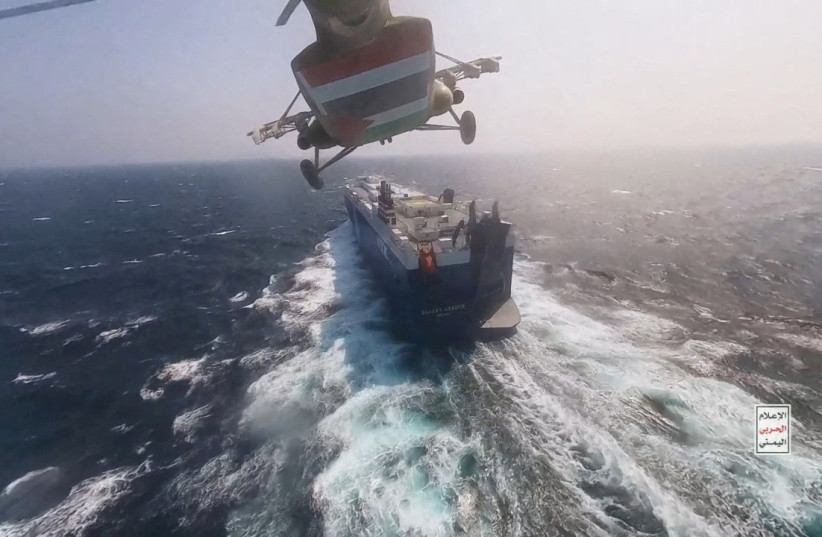Yemen's Iranian proxy group the Houthis said on Tuesday they hit a Norwegian commercial tanker delivering crude oil to an Israeli terminal, as Moscow moved closer to Tehran.
Foreign Minister Sergey Lavrov spoke with Iranian Foreign Minister Hossein Amirabdollahian and discussed the strengthening of bilateral ties between the two countries.
They “agreed to expedite the work on completing the coordination of a new grand interstate treaty, which has reached a high degree of readiness,” Lavrov’s office stated.
It followed a visit to Moscow earlier this month by Iranian President Ebrahim Raisi, who met with Russian President Vladimir Moscow in the Kremlin. In light of Russia’s war on Ukraine, Moscow has tightened its military alliance with Tehran. Iran’s Foreign Ministry described that visit as “highly significant,” explaining that it was brought up by Lavrov and Amir-Abdollahian in their call.
Prime Minister Benjamin Netanyahu, who spoke with Putin for 50 minutes expressed sharp criticism of the dangerous cooperation between Russia and Iran. Israel has been particularly concerned about the growing military ties between them.

Israel is also concerned that Iranian actions are helping transform Israel’s war against Hamas into an international conflict, such as the Houthi attacks on ships in the Red Sea such as the Norwegian vessel the STRINDA,.
The owners of the attacked tanker's owner, Norway's Mowinckel Chemical Tankers, said the vessel was headed to Italy with a cargo of biofuel feedstock, not crude oil. But it did acknowledge a tentative Israeli port call scheduled for January, details it had not offered in the immediate hours after the attack in the Red Sea.
"Upon the recommendation of our security advisors, it was decided to withhold this information until the vessel and her crew were in safe waters," the company said in a statement.
Following the attack, Israel’s military said it had deployed one of its most advanced warships, a Sa'ar 6 class corvette, in the Red Sea.
The US Navy destroyer Mason responded to the STRINDA's distress calls and assisted the crew, which was grappling with a fire, the US military said. It said the STRINDA was struck on Monday night by a land-based cruise missile fired from Houthi-controlled Yemen.
"The actions that we've seen by these Houthis forces are destabilizing, they're dangerous," Pentagon spokesperson Major General Patrick Ryder told a press conference on Tuesday.
"So, this is an international problem that requires an international solution," Ryder said. US Defense Secretary Lloyd Austin would be traveling to the Middle East next week, including to Israel, Qatar, and Bahrain, he said.
Houthi interventions
The Houthis have waded into the Israel-Hamas conflict - which has spread around the region - attacking vessels in vital shipping lanes and firing drones and missiles at Israel more than 1,000 miles from their seat of power in the Yemeni capital of Sanaa.
On Saturday, they said that to protest the Gaza war, they would target all ships heading to Israel, regardless of their nationality, and warned international shipping companies against dealing with Israeli ports.
Amir-Abdollahian, who was in Geneva on Tuesday, held calls with his Chinese and Turkish counterparts to discuss their opposition to the Gaza war.
In a speech to the UN in Geneva Amir-Abdollahian said that Israel and the United States will never be able to wipe out Hamas and that Israel could only secure the release of hostages held in Gaza with a political solution to the conflict.
He added that Israel, which has vowed to wipe out Tehran-backed Hamas, could only achieve the return of hostages taken by Hamas during a deadly rampage on Oct. 7 by a political solution.
Amirabdollahian was speaking at a meeting alongside counterparts from other Middle Eastern countries.
"All the ministers agree that the strikes by the criminal Israeli regime and the genocide it is committing has to stop immediately," Amirabdollahian said following the meeting.
"The Rafah border crossing has to be open, humanitarian aid has to reach every part of Gaza and the forced displacement of the people of Gaza must stop," he added, referring to the crossing into Egypt used to bring humanitarian aid into the enclave.
Israel mounted its assault on Gaza in response to a cross-border raid by Hamas fighters in which they killed 1,200 people and took 250 hostages in southern Israel on Oct. 7. More than 100 hostages were freed during a short-lived truce last month.
Israel's assault on Gaza to root out Hamas has killed at least 18,205 Palestinians and wounded nearly 50,000 since Oct. 7, according to the Hamas-run Gaza health ministry. Israel has said that 7,000 of Palestinian fatalities in Gaza were Hamas terrorists
Iran's Supreme Leader Ayatollah Ali Khamenei appealed last month to Muslim states with political ties with Israel to at least cut them for "a limited time". He had previously called for an Islamic oil and food embargo on Israel.
